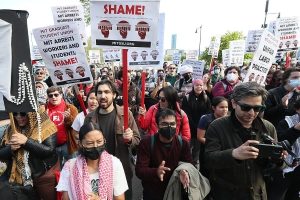In recent years, academic associations have increasingly come under scrutiny for the political statements they make. While these organizations have traditionally focused on advancing research and promoting professional development, some have begun to take stances on controversial political issues, sparking debate and criticism.
One of the most notable examples of academic associations facing critique for their political statements is the American Studies Association (ASA). In 2013, the ASA voted to endorse a boycott of Israeli academic institutions to protest the country’s treatment of Palestinians. This decision drew sharp criticism from many members of the academic community, who argued that the association’s stance was overly politicized and went beyond the scope of its mission.
Similarly, the Modern Language Association (MLA) has faced backlash for resolutions it has passed on topics such as academic freedom and the Israeli-Palestinian conflict. Critics have accused the association of using its platform to push a political agenda, rather than focusing on its core mission of promoting scholarship and education.
While some argue that academic associations have a responsibility to speak out on important social and political issues, others believe that these organizations should remain neutral and refrain from taking sides. Critics often argue that by making political statements, academic associations risk alienating members who hold differing viewpoints and diluting their credibility as objective arbiters of knowledge.
In response to these criticisms, some academic associations have revised their policies on political statements. The American Historical Association, for example, has established guidelines for how the organization can take positions on public issues, emphasizing the importance of maintaining scholarly credibility and fostering open dialogue among members.
Ultimately, the debate over academic associations and political statements raises important questions about the role of these organizations in shaping public discourse. While it is clear that these associations have a duty to uphold academic freedom and promote diversity of thought, the extent to which they should engage in political advocacy remains a contentious issue. As academic associations continue to navigate these challenges, it is crucial that they remain committed to fostering a culture of respectful debate and academic inquiry.



